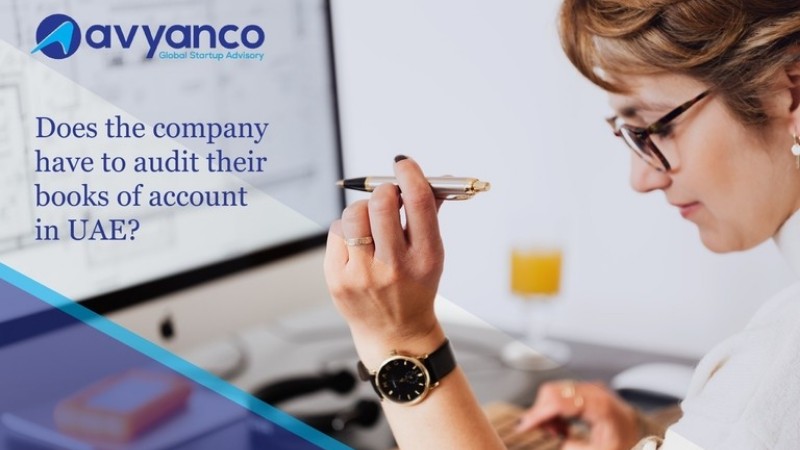The Commercial Company Law lays down that Audit of Books of Accounts is mandatory for all the companies incorporated in UAE Mainland. Companies incorporated in all Free zones also need to get their Books of Accounts Audited as per the laws & regulations laid down by the respective free-zone authority. It is mandatory for FZCO i.e., Free zone Company & FZE i.e., Free zone Establishments. Freezone Authorities like DAFZA, DWC, JAFZA, Creative City Fujairah & DSO & DIFC has made it mandatory for all companies registered under them to submit audit reports for renewal of their license.
In order to conduct a thorough, proper & comprehensive Auditing of Books of Accounts need to be properly maintained. As per the UAE Commercial Companies Law No 2 of 2015 all the companies in UAE mandatorily are required to maintain for at least 5 years. Currently, as per the law there is no enforcement to Submit an Audit Report to the authority however considering the global approach of UAE & its dynamic economy it will be mandated in near future. Article 27 of Chapter 2 of UAE Commercial Companies Law No. 2 of 2015 mandates every company to appoint licensed auditors registered with the Ministry of Economy for getting their books of audited. Even if the law doesn’t mandate audit it is always in the best interest of the company to get their books of accounts audited to ensure that the financial statements give a true & fair view.
Audit has been conceived to provide a highly useful & technical service to the economy to know performances in financial terms in a reliable manner. It is needless to say that multitudes of significant decisions in the economic society are taken based on the financial information and therefore reliability of such information is of utmost importance & an imperative necessity. Therefore, it is indeed critical to understand that a 3rd party auditing from a certified professionally competent firm is essential which will give you a true & fair view of the financial statements.
Why need the best Audit firm in Dubai to audit the financial statements?
To audit financial statements any business or commercial house needs the service of a qualified auditor or a chartered accountant. Audit and Assurance ensure numerous benefits:
- To determine how adequate Internal Controls are in the Organization
- To encourage best industry practices for controls
- To ensure timely & regular compliance with all the policies & regulations
- To identify operational inefficiencies and waste
- To review IT projects, systems, and technology
- To provide an objective insight
- To assess efficient and responsible use of resources
- To identify potential cost savings & also assist management in addressing complex, cross-functional issues
- To adhere to statutory compliances
Process Involved for External Audit of companies every year:
- Characteristics of the Engagement
- The financial reporting framework.
- Industry-specific reporting requirements like reports mandated by industry regulators.
- The expected audit coverage, including the amount and locations of components to be included.
- The character of the control relationships between a parent and its components determine how the group is to be consolidated.
- The extent to which components are audited by other auditors.
- The entity’s use of service organizations and therefore the way the auditor may obtain evidence concerning the planning or operation of controls performed by them.
- The expected use of audit evidence obtained in previous audits, for instance, audit evidence associated with risk assessment procedures and tests of controls.
- The effect of knowledge technology on audit procedures.
- The provision of client personnel and data.
- Reporting Objectives, Timing of the Audit, and Nature of Communications
- The entity’s timetable for reporting.
- The organization of meetings with management regarding audit work (Nature, timing and extent).
- The discussion with management regarding the type and timing of reports to be issued.
- The discussion with management regarding communications on the status of audit work.
- Communication with auditors of components regarding types and timing of reports to be issued.
- The nature and timing of communications among engagement team members.
- Whether there are any other expected communications with third parties, including any statutory or contractual reporting responsibilities arising from the audit.
Significant Factors, Preliminary Engagement Activities, and Knowledge Gained on Other Engagements
- The determination of materiality in accordance with SA 320.
- Preliminary identification of areas where there may be a higher risk of material misstatement.
- The impact of the assessed risk of material misstatement at the overall financial statement level on direction, supervision and review.
- The manner in which engagement team members need to maintain an inquisitive/ questioning mind and exercise professional skepticism and unpredictability.
- Results of previous audits including the identified deficiencies and action taken to address them.
- The discussion of matters that may affect the audit with firm personnel responsible for performing other services to the entity.
- Evidence of management’s commitment to the design, implementation and maintenance of sound internal controls.
- The volume of transactions may determine reliance on internal control.
- The importance attached to internal control
- Significant business developments affecting the entity.
- Significant industry-specific developments and development in the economic environment.
- Significant changes in the financial reporting framework, such as changes in accounting standards.
- Other significant relevant developments, such as changes in the legal and regulatory environment affecting the entity.
- Nature, Timing and Extent of Resources
- The choice of the engagement team and therefore the assignment of audit work to the team members
- Engagement Budgeting
Process involved for Internal Audit of the companies
Internal Auditing may be a systematic and independent examination of data, statements, records, operations and performances (financial or otherwise) of an enterprise, for a stated purpose. The auditor perceives and recognizes the propositions before him for examination, collects and evaluates evidence and formulates an opinion communicated through the audit report. Internal audit is an independent appraisal involving the specialized application of techniques of auditing in accordance with the precise needs of an enterprise. The nature and scope of internal audit depend upon the wants of an enterprise. It is a scientific evaluation of risk management, control and governance processes particularly with reference to:
- Safeguarding of assets
- Compliance with laws, regulations and contracts as well as policies laid down by the management
- Reliability and integrity of financial and operational information
- Effectiveness and efficiency of operations
- The accomplishment of objectives and goals of the organization through ethical and effective governance
It is, however, pertinent to notice that variations in propositions don’t change the essential philosophy of collecting and evaluating evidence and formulating an opinion; what undergoes a change is that the approach, the tools and therefore the techniques used. Internal audit activities are performed by suitably trained persons within or outside the organization or by a mix of both. Internal audit is, therefore, a vital tool within the hands of the management to assist improve its higher cognitive process. The growing importance of internal audit to good governance will be appreciated from the spate of legal and regulatory requirements world over, directly or indirectly necessitating the necessity for internal help management to rope in the services of internal audit to assist in improving the former’s efficiency in running an enterprise. However, before discussing how internal audit can help management therein respect and therefore the drivers of an efficient and effective internal audit, it’s essential to know the varied stages of evolution of internal audit over time.
How Avyanco Can Help You with Auditing Services in Dubai?
Avyanco is one of the leading Tax and Accounting firms in UAE. We offer end-to-end customized solutions for Bookkeeping – Accountancy, Tax Compliance & Advisory, Audit – Assurance & Corporate Office Space. What gives us an edge over other business service providers in the UAE is that we execute our accounting services in compliance with internationally adopted practices as it provides handholding in a complex jurisdiction.
Contact Avyanco & allow our Audit experts to guide you for External Audit and Internal Audit of the company in UAE. Call/WhatsApp: +971 50 3989000, (T): +971 4 240 5000, Email: info@avyanco.com.
FAQs
What are the Audit requirements in UAE?
Under the commercial company laws UAE, all the small to medium to large scale companies working in the mainland are required to get their book of accounts audited. Failing in complying with the laws might result in the imposition of fines and penalties. You can hire tax consultants in Dubai who can help you understand the technicalities of the process. Avyanco is the best auditing firm working in Dubai that you can count on!
Is audit mandatory in UAE?
In short, yes! Audit of accounts in Dubai is mandatory.
Why is an audit mandatory for all the companies in UAE?
Auditing company in UAE helps businesses comply with the laws and run a business without any obstacles. Avyanco is an experienced and professional auditing firm in Dubai. We help companies examine their books of accounts, identify any financial errors, and meet the country’s auditing standards.



